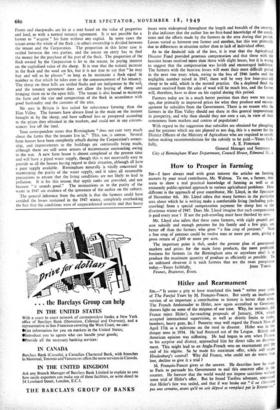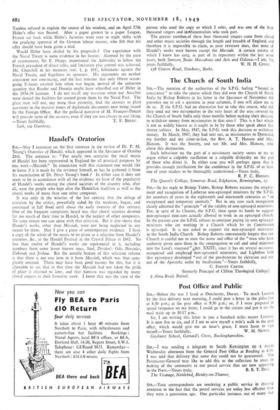Hitler and Rearmament SIR,-" It seems a pity to have
translated this book " writes your critic of The Fateful Years by M. Francois-Poncet. But surely an inadequate version of so important a contribution to history is better than none. The French Ambassador to Hitler, now again accredited to Germany, throws light on some of the enigmas of our time. Why, for instance. did France reject Hitler's far-reaching proposals of January, 1934, which accepted international supervision, as well as drastic limits to tanks, bombers, heavy guns, &c.? Posterity may well regard the French Note of April 17th as a milestone on the road to disaster. Hitler was in the danger zone in 1934. He had flounced out of the League. British and American opinion was stiffening. He had begun to arm when France, to his surprise and dismay, approached him for direct talks on disarma- ment. This might lead to an Anglo-French veto on rearmament and the end of his regime. So he made his maximum offer,
while still under Hindenburg's control! Why did France, who could not do worse than lose, decline to give it a trial ?
M. Francois-Poncet gives us the answer. He describes how he %%rot to Paris to persuade his Government to nail this concrete offer to the counter. He foresaw that the world would not impose sanctions without some trial of Hitler's offer. But he found Tardiest adamant, convinced that Hitler's fate was sealed, and that if war broke out " it ne 5We:der! pas erne semaine, avant qu'il ne soil depose et remplaci par Is Kronpwa.
Tardieu refused to explain the source of his wisdom, and on April 17th Hitler's offer was flouted. After a paper protest to a paper League, France sat back while Hitler's factories went over to night shifts with the grudging approval of the German labour masses, who felt that his offer should have been given a trial.
Would Hitler have abided by his proposals ? Our experience with the Naval Treaty is some evidence in his favour. Alarmed by the pace of rearmament, Sir E. Phipps importuned the Admiralty to follow the French precedent of direct talks, and limitation plus control was achieved. Mr. Churchill in his memoirs (vol. 1, p. 108), fulminates against the Naval Treaty, and flagellates its sponsors. His arguments are neither consistent nor convincing, and the fact remains that only fifteen ocean- going U-boats awaited him when war began, instead of the unknown quantity that Raeder and Doenitz might have wheedled out of Hitler in the 1934-39 lustrum. I do not recall any occasion when our Attaches were denied the facilities for control given them by the Naval Pact. The plain man will not, any more than posterity, find the answers to plain questions in the massive tomes of diplomatic documents now being issued by the Foreign Office. But the pellucid narrative of M. Francois-Poncet will provide some of the answers, even if they are not always to our liking. —Yours faithfully, T. F. BREEN. Sark, via Guernsey.















































































 Previous page
Previous page